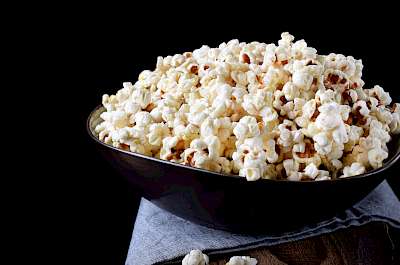Popcorn: Calories and Nutrition Analyse
Also known as (other names): Popping corn
How many calories in popcorn?

Nutrition Facts
PopcornServing size:
handful of popcorn (4 g) change
5g10g15g20g30g40g50g60g80g100g120g140g160g180g200g220g250g300g350g400g450g500g600g700g800g900g1000g
1oz2oz3oz4oz5oz6oz7oz8oz10oz12oz15oz20oz25oz30oz35oz40oz50oz
Amount Per Serving:
100g of popcorn contain about 387 calories (kcal).
Calories per:
ounce
| handful
| glass
| cup
| half cup
Case in point, a handful of popcorn (4 g) contain about 15 calories.
This is about 1% of the daily caloric intake for an average adult with medium weight and activity level (assuming a 2000 kcal daily intake).
Scroll down for details and nutrition tables.
To visualize how much 15 kcal actually is, keep in mind that the calorie content of handful of popcorn is similar to that of, for example:
- 0.5 cube of sugar
Take a quick look at the tables below for detailed information about popcorn nutrition.
100g of Popcorn
Nutrition
- Calories387
- Carbs Total77.78 g
- Dietary fiber14.5 g
- Fat4.54 g
- Protein12.94 g
- Water3.32 g
Vitamins
- Vit A196 IU
- Vit B1 (Thiamine)0.104 mg
- Vit B2 (riboflavin)0.083 mg
- Vit B3 (Niacin)2.308 mg
- Vit B60.157 mg
- Vit B9 (Folic acid)0.031 mcg
- Vit E0.29 mg
- Vit K0.001 mg
Minerals
- Potassium329 mg
- Phosphorus1.2 mg
- Magnessium144 mg
- Calcium7 mg
- Sodium8 mg
- Iron3.19 mg
- Zink1.2 mg
Popcorn: A Nutritional Powerhouse in Your Snack Bowl
Popcorn isn't just a movie theater staple; it's a whole grain snack that packs a nutritional punch. Whether you're enjoying a cozy movie night at home or looking for a healthy snack option, understanding the popcorn calories, popcorn nutrition, and its role in a balanced diet can help you make informed choices. Let's dive into the fascinating world of popcorn and its nutritional benefits.
Popcorn Calories and Nutritional Profile
One of the most surprising facts about popcorn is its calorie count. With 387 calories per 100 grams, it's a relatively low-calorie snack option, especially when compared to other snack foods. But calories aren't the whole story. The nutritional value of popcorn is what truly sets it apart.
- Carbohydrates: Popcorn is primarily composed of carbohydrates, with 77.78 grams per 100 grams. However, it's not just any carbs; popcorn is rich in dietary fiber, offering 14.5 grams of fiber. This high fiber content aids in digestion and can help you feel fuller longer, making popcorn an excellent snack for weight management.
- Protein in Popcorn: With 12.94 grams of protein, popcorn is a good source of plant-based protein, contributing to muscle repair and growth.
- Fat in Popcorn: Popcorn is low in fat, with only 4.54 grams per 100 grams. The type of fat matters too, and popcorn primarily contains healthier, unsaturated fats, especially if air-popped or prepared with a minimal amount of healthy oils.
- Minerals and Vitamins: Popcorn is a treasure trove of essential minerals and vitamins. It contains iron, magnesium, phosphorus, potassium, and zinc, along with vitamins A, B1, B2, B3, B6, and E, contributing to overall health and well-being.
The Role of Popcorn in a Healthy Diet
Given its nutritional profile, popcorn can play a beneficial role in a healthy diet. Its high fiber content is excellent for digestive health and can aid in preventing constipation. The protein in popcorn can help in muscle maintenance and growth, making it a great snack for fitness enthusiasts. Moreover, the low fat and calorie content make popcorn an ideal choice for those looking to manage their weight without sacrificing taste.
However, it's important to note that the way popcorn is prepared can significantly affect its nutritional value. Air-popped popcorn without added butter or sugar is the healthiest option. Movie theater popcorn, on the other hand, can be high in calories and unhealthy fats due to the excessive amounts of butter and salt often added.
Conclusion
Popcorn is more than just a tasty snack; it's a nutritional powerhouse that can fit well into a balanced diet. With its high fiber, protein, and low fat content, along with essential vitamins and minerals, popcorn offers numerous health benefits. Next time you reach for a snack, consider the humble popcorn — not only is it delicious, but it's also good for you. Just remember to keep it simple and healthy with air-popping and minimal additives to fully enjoy its nutritional benefits.
How many calories are there in 1, 2, 3, or 5 servings of popcorn?
- Handful of popcorn (4g)15 kcal
- Glass full of popcorn (9g)35 kcal
- Cup of popcorn (8g)31 kcal
- Half cup of popcorn (4g)15 kcal
- Ounce (oz) of popcorn110 kcal
- Half of medium size servings of popcorn7.5 kcal
- Small size serving of popcorn (3g)12 kcal
- Big size popcorn (5g)19.5 kcal
- Two medium size servings of popcorn30 kcal
- Three medium size servings of popcorn45 kcal
- Four medium size servings of popcorn60 kcal
- Five medium size servings of popcorn75 kcal
Compare popcorn:
popcorn vs corn, popcorn vs sweetcorn, popcorn vs nachos, popcorn vs fries, see all compares of popcorn.

Similar calories number have:
See also:
Read this:
- How many calories does shrimp have?
- Calories in a half of sesame bagel
- Calories in whole sesame bagel
- Calories for one, two or more sesame bagels
- How many carbs (carbohydrates) in Triscuits crackers?
- How much fat in long island iced tea?
- How much protein in soft serve ice cream?
- What is weight of McDonalds Sundae Caramel?
- Risotto calories per ounce (oz)
- Peanut butter cookies calories per serving size



Add comment